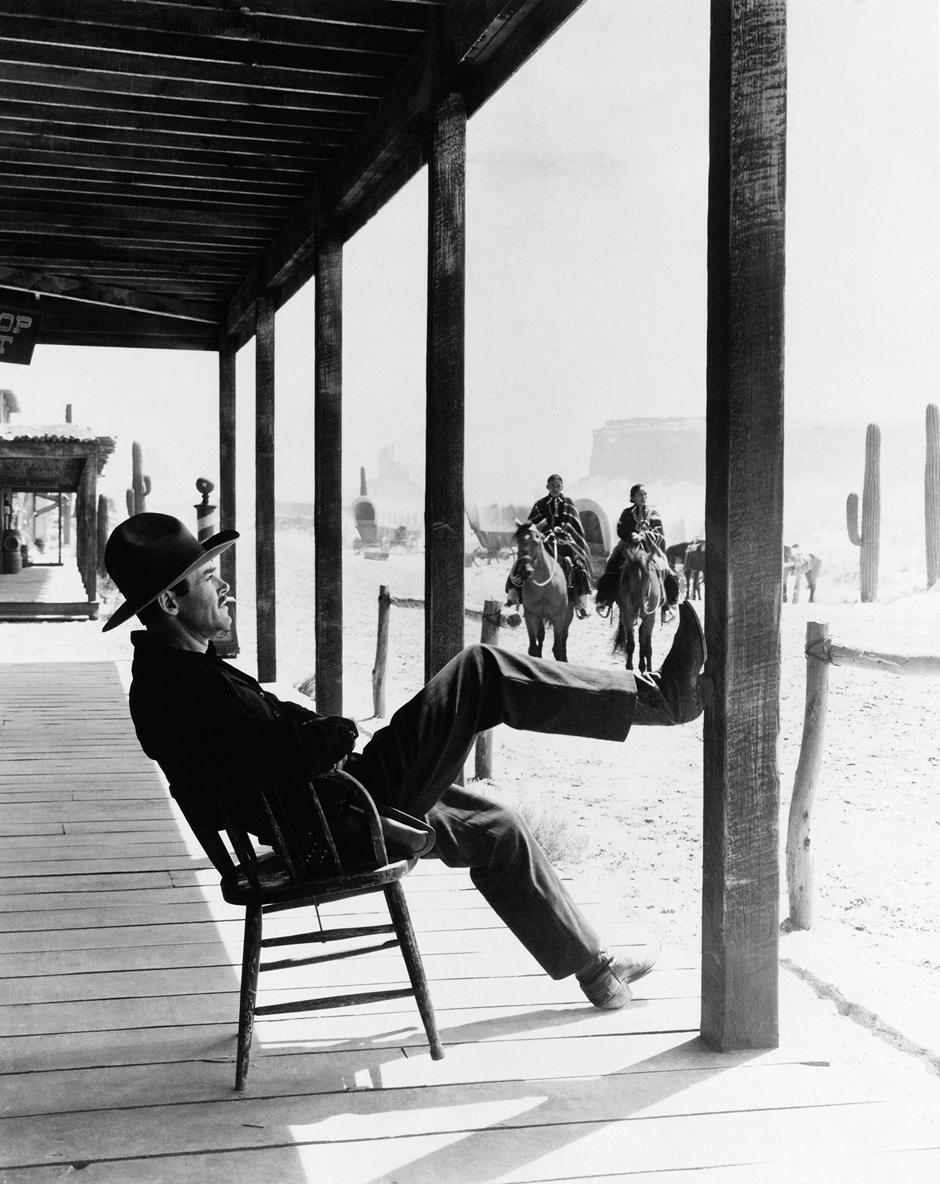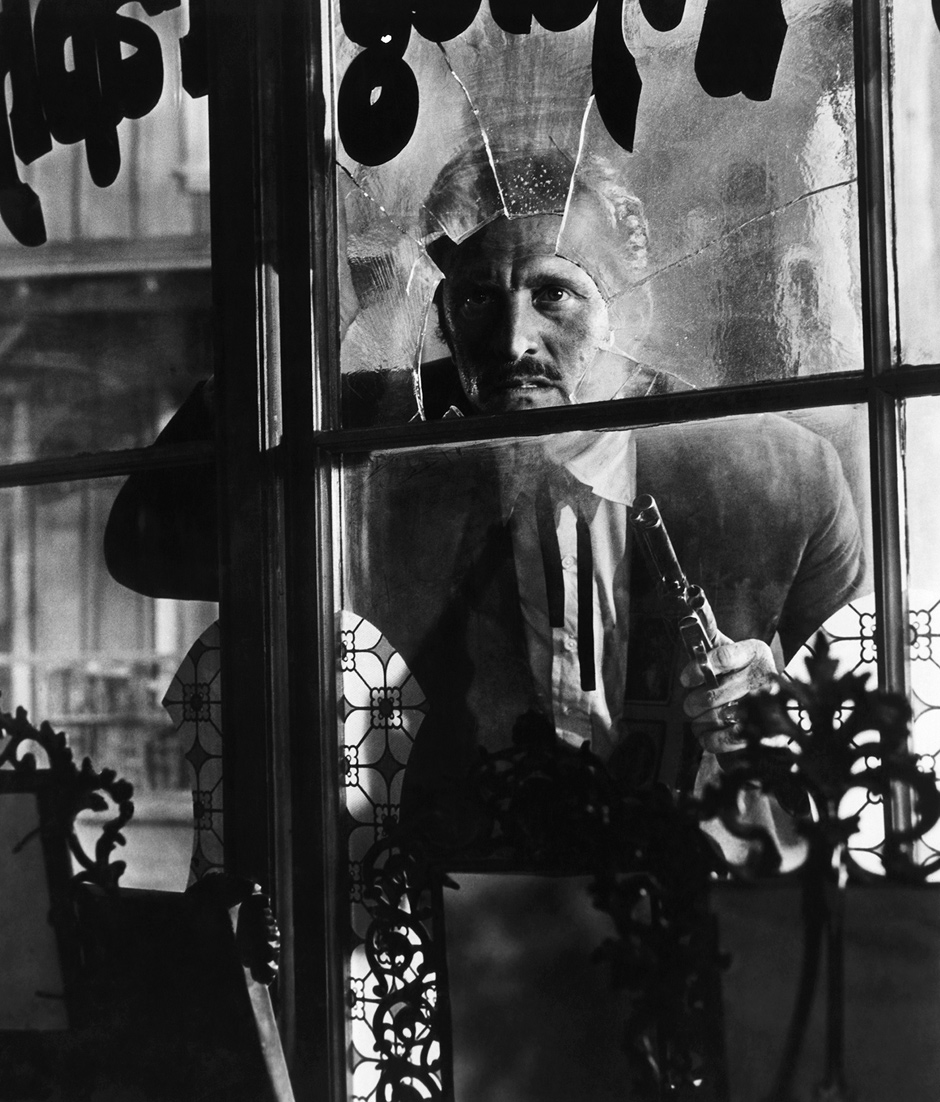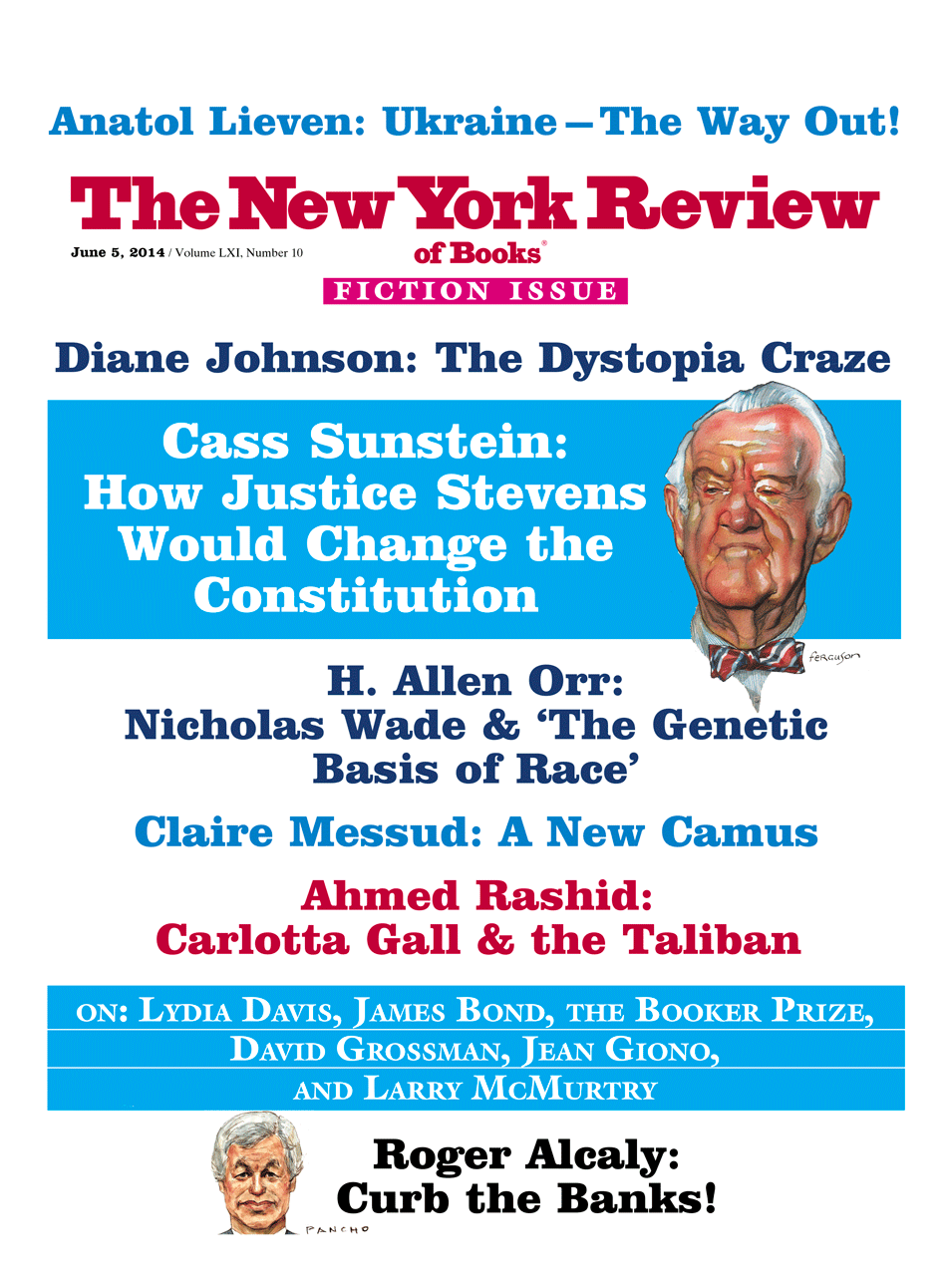When the legend becomes fact, print the legend.
—John Ford
Already in the 1880s a cannily vulgar mythologizing of the Old West had begun. Here are Wyatt Earp and Doc Holliday awkwardly impersonating themselves in Buffalo Bill’s Wild West Show in Denver, as reported in Larry McMurtry’s radically distilled new novel The Last Kind Words Saloon:
The gunfighter skit involving Wyatt and Doc did not, at first, go well at all. For one thing the pair had not bothered to practice—both despised practice, on the whole.
“Pull a pistol out of a dern holster and shoot it—why would that require practice?” Wyatt wondered….
Sure enough, on the very first draw, Wyatt yanked his gun out so vigorously that it somehow flew out of his hand and landed twenty feet in front of him with the barrel in the dirt.
Doc, meanwhile, had the opposite problem: he had jammed his pistol in its holster so tight that it wouldn’t come out. This behavior annoyed Doc so much that he ripped off the holster and threw it at a bronc, which happened to be loose in the arena.
The crowd was largely silent: this was not what they had expected; many members of the audience were eager to get on to the dramatic reenactment of Custer’s Last Stand….
“They’ve made it into a comedy routine,” [Bill Cody] said….
The second night went little better. Some prop man filled Doc’s gun with blanks but forgot to do the same with Wyatt’s. Doc then shot Wyatt six times while Wyatt snapped his useless pistol six times.
If the fabled gunslingers had been skilled actors playing “Wyatt Earp” and “Doc Holliday”—quasi-historic Wild West figures—the audience, eager to be entertained, would have applauded; unfortunately, the men are the actual Wyatt Earp and Doc Holliday, thus at a disadvantage. By the time they finally get their routine right, the crowd has lost interest; by the sixth night of performing, the show is shut down by Harry Tammen, “the magnate who owned the show and most of Colorado.” The disappointed gunslingers are told that there are other shows: “Texas Jack might hire you, and there’s plenty of gambling dens here in Denver.”1
Drawing upon the particular sort of bittersweet/sardonic nostalgia for the Texas past that pervades McMurtry’s grand epic Lonesome Dove (1985), the most acclaimed and best-loved of his many novels, The Last Kind Words Saloon is a deftly narrated, often comically subversive work of fiction described by its author as a “ballad in prose whose characters are afloat in time; their legends and their lives in history rarely match.” If Lonesome Dove is a chronicle of the cattle-driving West that contains within its vast, broad ranges a small but heartrending intimate tragedy of paternal neglect, The Last Kind Words Saloon is a dark postmodernist comedy in which intimacy is flattened to cartoon thinness, and human personality is a matter of the most fleeting mortality.
Much of McMurtry’s fiction—from the early, perfectly rendered Horseman, Pass By (1961) and The Last Picture Show (1966) through Lonesome Dove, Texasville (1987), Streets of Laredo (1993), Duane’s Depressed (1999), and By Sorrow’s River (2003)—has been richly elegiac,2 but in The Last Kind Words Saloon the author has replaced elegy with a merciless sort of irony. It’s as if Vladimir and Estragon of Beckett’s Waiting for Godot have been transformed into two aging gunslingers trading wisecracks and platitudes in an existentially barren western landscape, waiting for a redemption that never comes.
The author admiringly alludes to John Ford’s famous remark about life and legend, printed above, in a preface to The Last Kind Words Saloon. But the novel seems to subvert the director’s dictum: it isn’t the inflated legends of western gunslingers with which it is concerned but the less-than-heroic lives behind the legends; the lives of men like Wyatt Earp, Doc Holliday, Kit Carson, Johnny Ringo, Buffalo Bill Cody, and the participants in the notorious 1881 gunfight at the O.K. Corral, among others. All of them figured in the history of the Old West largely by chance, having been in the right place at the right time.
Appropriately, The Last Kind Words Saloon derives its title from a portable sign that one of Wyatt Earp’s brothers carries with him to affix to a number of saloons in Texas and Arizona. (“Warren Earp drug it around all over the place. We never did know what he meant by it,” Wyatt Earp’s wife Jessie comments years later.) The novel is divided into four sections determined by their settings: Long Grass, Denver, Mobetie, Tombstone. As in a classic western film characters seem to arise out of the landscape and to be contained within it.
Advertisement
Though many things will happen to Wyatt, Doc, their wives, companions, and adversaries, human agents seem curiously passive here in the West, like puppets in the service of history. Less distinctive even than the small Texas brush town Lonesome Dove, Long Grass is “nearly in Kansas, but not quite. It’s nearly in New Mexico, too, but not quite. Some have even suggested that we might be in Texas.” (As Wyatt observes: “The one thing that’s certain is that Long Grass has no newspaper office…. For that matter it has no news.”)
It is in Long Grass that the novel begins, with a cinematic flourish of a scene that swiftly introduces most of the main characters of the novel; it is in Tombstone (Arizona) that the novel’s climactic scene is placed, with the legendary gunfight at the O.K. Corral. For pages the novelist has been foreshadowing this dramatic spectacle and yet, when the gunfight at last erupts, it is rendered so offhandedly that the incident feels anticlimactic, unreal. (Note that “offhandedly” is a gun term, meaning shooting a gun without aiming it and without premeditation.) Narration has shrunk to film-script brevity as Wyatt, Doc, and Wyatt’s brothers, all armed, walk up the “dusty street” toward the Clantons’ corral:
“This is a damn waste of time,” Wyatt said.
“Now didn’t I predict that very thing?” Doc said. “I told you to leave it be.”
But just as he said it gunfire erupted and Morgan went down.
“No, no…I don’t want this,” Virgil [Earp] said. “I’m the sheriff.”
Then he went down too.
Ike Clanton quickly ran into the photographer’s shop and was not shot. Both McLaureys fired and Wyatt killed them both. Somebody hit young Billy Clanton, who died after a brief agony.
Doc was nicked, Wyatt untouched….
When Wyatt walked in on [his wife] Jessie she grabbed him and held him tight and kissed him passionately.
“You fool, you could have been killed,” Jessie said, crying.
“Yes, but I wasn’t; let go,” Wyatt said.
So much for legend.
Readers of The Last Kind Words Saloon are likely to think of a film script more readily than a ballad, for the novel unfolds with the dreamlike fluidity and lightness of touch of film with its quick cuts, flashbacks, and ever-moving, restless camera. Fifty-nine short chapters are divided into paragraphs that are frequently single, simple declarative sentences. Landscape is purely visual, atmospheric: “Beyond the tiny town there was the vastness of the plains: colorless, gloomy, vast: the sea of grass….” The sketchily drawn figures of The Last Kind Words Saloon do indeed seem to float about freely in time; often they are hardly more than fleeting images on a screen, uttering gnomic remarks to one another:
“Do you ever wonder what it will be like to die?” Doc asked.
“No, I spend very little time in idle speculation,” Wyatt said.
Like former Texas Rangers Captain Woodrow Call and Augustus McCrea of Lonesome Dove, Wyatt Earp and Doc Holliday are contrasting personalities: Earp is taciturn, Holliday loquacious. Earp has a “big reputation as a gunfighter, which puzzled Jessie, because as far as she knew he had never actually killed anybody.” Doc is affable, “rarely sober.” Earp has been a pimp, a law enforcement officer for hire, and a saloon-keeper; Doc shuns work, but is a capable gambler. The men appear to be friends by default, as if they have no choice. Their conversations have the ring of repartee. As both are poor at impersonating themselves, both are poor shots at target practice when they are alone and unobserved:
Wyatt fired three times, shattering no bottles. Annoyed, he threw his pistol at the line of bottles, knocking over three. Then he took a derringer out of an inner pocket and shattered two, to his surprise.
Doc was still struggling with the difficult prone position. He shot but no bottles shattered. He drew back his arm to throw the gun but then caught himself at the last second.
“Throwing guns is a bad habit,” he said. “You might throw your gun away just as some loose Indians come charging down upon you.”
“There ain’t no more loose Indians, Doc,” Wyatt said. “But if there were, throwing your gun wouldn’t help you.”
He fired once more with the derringer and shattered a bottle.
“Good lord, I hit one,” he said. “Luck ain’t to be despised.”
“Who said I despised it?” Doc said, dusting off his vest.
The Last Kind Words Saloon begins with a clandestine meeting in a “royal purple” railway car between the Texas rancher Charlie Goodnight and the “tallest man in England, and also the richest,” Lord Benny Ernle; their plan is to be partners in “the biggest ranch in the world.” Ernle has “made himself a legend in the West by ordering the construction of a vast castle on a bluff overlooking the Canadian River.” But in several swift chapters the wealthy Englishman is dead in a riding accident in rough terrain, and the deal with Goodnight is thwarted. Like a sardonic chorus Wyatt Earp and Doc Holliday are observers of this folly at a distance.
Advertisement
In the interstices of the white men’s blundering stratagems, Kiowa Indians behave badly under the leadership of the demonic Satank and Satanta the Red Bear. Their atrocities are the stock-in-trade of westerns, though their motive would bear scrutiny in another, more traditional novel of the sociology of the West:
The teamsters…paid a heavy price for having blundered into the People’s country. The leader, a stout man who yelled the loudest, was chained facedown from a wagon tongue and slowly burned alive—his screams could be heard for a long time, along with those of a tall boy who had his genitals cooked over a small fire….
The other two teamsters were disemboweled, their guts pulled out so some hot coals could be stuffed into their stomach cavity. Satank also cut off their noses and forced them to eat some of their own offal.
Afterwards the members of the little war party felt fine. Torturing whites was a splendid way to spend the afternoon. Seeing to it that your enemies died as painfully as possible was the best revenge for what the whites had taken from them.
The women of The Last Kind Words Saloon are familiar McMurtry types, sharp-tongued wives and “whores” who appear to be, however improbably in this rough environment, more than matches for the men. Wyatt Earp has an uneasy relationship with his wife Jessie, who frequently goads him into hitting her; when Doc Holliday asks Jessie why she behaves in this way she says, “To see if he’s alive…. To see if he cares.” (Earp does, enough to knock Jessie violently across a room and split her lip. “Oh Jessie, why will you provoke me? I don’t mean to hit you—it just wells over.”)
About the inquisitive reporter Nellie Courtright it is said that, annoying as she could be, “There was no denying she was pretty. Bearing [six] children had not spoiled her figure. If anything she was higher-breasted than Jessie.” The rancher Charlie Goodnight’s sexually aggressive schoolteacher wife Mary tells her husband that she is giving him ten years “to make this into a proper county, with judges and courts and all that goes with a county. And after the courthouse I want a college, where people can learn their algebra. Do those two things in a timely fashion and maybe I won’t leave you for brighter climes.”
The consort of the wealthy, doomed Englishman is the exotic San Saba, “the most beautiful whore on the plains”; San Saba has a unique background, having been born in a Turkish seraglio and raised by eunuchs until she’d managed to be purchased and rescued by Lord Ernle. (“‘Rather filthy specimen, that sultan,’ Lord Ernle said. ‘Hamid something. I couldn’t see wasting such beauty on Orientals.’”) Casually it is revealed that Lord Ernle, with an English wife and an exotic American consort, nonetheless prefers “enjoying his many boys,” though McMurtry doesn’t chronicle any of these dalliances.
With the gunfight at the O.K. Corral, the saga of The Last Kind Words Saloon comes to a rudely abrupt end. As a kind of epilogue is a final chapter titled “Nellie’s Visits by Nellie Courtright,” a chattily nostalgic look back to the 1880s:
Once I got bitten by the journalism bug there was nothing to stop me from going wherever the stories took me, which was pretty much all over our Old West as it was waning…. I had long forgotten Wyatt Earp and his violent brothers when he was brought to my attention by a story in a newspaper about a riot that took place in Oakland. There had been a big prizefight and Wyatt Earp had been the referee.
Nellie Courtright has been winding her way through The Last Kind Words Saloon writing up tales of the Old West for such papers as the New York Sun. Of the novel’s brave, plucky, reckless, and undaunted women, Nellie is perhaps the most admirable: “She was needing money just then—she had six girls to educate and clothe so she immediately took the job.”
Suddenly then, at the very end of The Last Kind Words Saloon, which has been a chronicle of the follies of men, it appears that a woman, Nellie Courtright, has been the chronicler. Very few men of the era have survived, but Nellie is living in Santa Monica. She travels down the coast to San Pedro to interview Wyatt Earp for a final time, discovering to her horror that he and Jessie are living in squalor: “The famous hero of the O.K. Corral was now a rheumy-eyed old man who spent his days spitting tobacco into a coffee can.” Jessie “had always been a large woman, but now she had spread, while Wyatt seemed to have shrunk.”
Wyatt doesn’t remember Nellie Courtright, or much of the past, but he does recall that his old friend Doc Holliday has died—“of the TB, up in Colorado.” Amid the trash in the Earps’ front yard Nellie discovers Warren Earp’s old sign for The Last Kind Words Saloon, which she offers to buy, and which Jessie hands over without wanting payment: “So I took the sign, not quite sure why I wanted it, put it in the back of my convertible, and drove away.”
When the celebrated gunslingers have died, or have lapsed into the oblivion of age and senility, Larry McMurtry tells us in his coruscating, antiheroic work of fiction, the “legend” may yet endure—a battered sign haphazardly rescued from a dump heap by a tabloid journalist.
-
1
McMurtry has explored the phenomenon of the making of Old West mythology previously, in The Colonel and Little Missie: Buffalo Bill, Annie Oakley, and the Beginnings of Superstardom in America (Simon and Schuster, 2005). In The Last Kind Words Saloon the narrator mentions offhandedly how after Wyatt Earp’s intervention with the Clanton herd of cattle and the subsequent stampede, the subject of chapter fifty, a popular “dime novelist” wrote about the incident in a “dime novel,” Ghost Herd of the Animas:
It sold a million copies. Forty years later tourists thought they saw ghost cattle racing through the sage at dawn. Wyatt and Doc were often mentioned, and yet neither of them had fired a shot.
↩ -
2
In his early essay collection In a Narrow Grave: Essays on Texas (1968), McMurtry notes that, for the Texas writer, the passing of the Old West—“the passing of the cowboy”—is an “inescapable subject.” Driving the legendary beef herds to slaughter across the Great Plains, however dangerous, impractical, and short-lived in the history of the American frontier, nonetheless lives on in the literature of heroic nostalgia, and in popular song, as if what is being lamented isn’t just the passing of a way of commercial life but the romance of life itself:
I’m going to leave
Old Texas now,
They’ve got no use
For the longhorn cow.They’ve plowed and fenced
↩
My cattle range
And the people there
Are all so strange…




